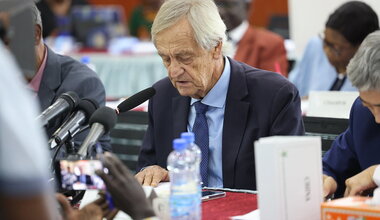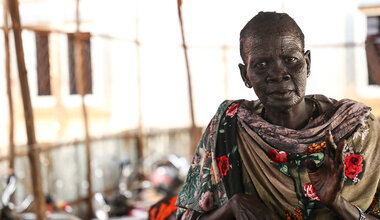Statement by Nicholas Haysom, Special Representative of the UN Secretary-General and Head of UNMISS, to the Security Council
[As Delivered]
Mr. President
Thank you for the opportunity to brief on developments in South Sudan.
When I last updated this Council in April, I conveyed the Secretary-General’s assessment that the parties were yet to achieve a ‘critical mass’ of the implementation of key steps necessary for a peaceful conduct of free, fair and credible elections. The Secretary-General had recommended that the parties to the peace agreement engage with one another to find a consensual approach to the holding of these elections.
Since then, discussions have, indeed, continued amongst the parties towards resolving these and other priority outstanding issues in the Roadmap. We understand the High-Level Standing Committee has completed its report, which is anticipated to be discussed by the Presidency yesterday as well as today, and we understand that a preliminary report has been released by the Minister of Cabinet Affairs as of last night. On the critical issue of the date of elections, we understand, however, that no date has been agreed, as yet and that the President has designated the electoral institutions to produce a feasible proposal on when these elections may be held.
Meanwhile, in May, a second dialogue process was launched in Nairobi, known as ‘the Tumaini Initiative’. These talks—re-located from Rome and now hosted by the Government of Kenya—seek to ensure that non-signatory parties, civil society, faith-based groups and traditional leaders join the peace process.
The Tumaini Initiative has proposed new monitoring, oversight and implementation mechanisms and a National Leadership Council structure. In response to these proposals, the SPLM/IO announced its withdrawal from the Tumaini process on 16 July, citing concerns that the Tumaini Initiative dealt with matters that were already agreed in the Revitalized Peace Agreement and accordingly it had gone beyond its remit. There is currently a lack of clarity as to whether the SPLM/IO has reversed that decision but, as part of the report of last evening, there is an indication that this is under review.
My team and I have employed all good offices at our disposal to engage the parties involved in these ongoing processes, including the Tumaini mediation team. I welcome the spirit of consensus-building in which both dialogue processes have been conducted. UNMISS has encouraged an approach whereby both processes would be mutually reinforcing in the search for consensus between all stakeholders: that is, amongst formal signatories and non-signatories to the peace agreement.
As things stand, however, it seems that further clarity is required on how the Tumaini initiative, and its outcomes will converge with, and thus complement, the framework of the Revitalized Peace Agreement. To be clear, the Mission is not championing either process as an exclusive modality but is promoting the constructive confluence of the two. It is imperative that both processes advance with deliberate speed to deliver on the aspirations of South Sudanese citizens.
Mr President,
With regards to the overall implementation of the Revitalised Agreement and its Roadmap, I refer to your forthcoming briefing of the Chair of the Reconstituted Joint Monitoring and Evaluation Commission (RJMEC), Ambassador Maj. Gen. Charles Tai Gituai. UNMISS notes that some steps have been taken by the parties and institutions since my last report, which includes the provision of funding to the National Constitutional Review Commission, albeit short of a fully operational budget. State High Elections Committees have been appointed and, with UNMISS assistance, the NEC has begun assessing the ground-level infrastructure and facilities required for a conducive environment for conducting elections.
To date, 29 political parties have been registered, although some parties continue to object to: firstly, the registration fee amount set by the Political Parties Council; secondly, the announcement of the closure of the registration period; and thirdly, the practice of some parties, contrary to the act, in maintaining military formations.
On 5 July, the National Elections Commission announced 22 December 2024 as the date for elections, citing its legal obligations under the National Election Act. I note, however, there is still ongoing consultation between the political stakeholders as to whether elections can or should be held this year. This makes it difficult to treat 22 December as a definitive trigger in isolation from other critical factors.
If a final decision is made in favour of elections in December, UNMISS would proceed with this Council’s mandated request for the Secretary-General to provide a report on the security situation, which will include protection of civilians and force protection evaluations, 90-, 60- and 30-days before any election.
In the meantime, UNMISS continues to support the creation of an enabling environment for elections in South Sudan, whenever they are to be held. We are focusing on maximising the Mission’s protection presence through three key lines of effort (that is: dialogue and engagement, physical protection, and the creation of a broader protective environment); this includes through capacity building support to the host government towards a greater self-reliance in the protection of its own people.
On that note, I must report the concerns of South Sudanese stakeholders, including civil society, political parties, the Commission on Human Rights in South Sudan, and members of the international community with regards to the National Security Act 2014 (Amendment) Bill 2024 currently passed by parliament. The powers of arrest without warrant granted to the National Security Service are claimed to be incompatible with the spirit of South Sudan’s transitional Constitution, the Revitalized Agreement as well as South Sudan’s human rights treaty obligations under regional and international human rights law. National stakeholders hold that the law is in contradiction with their aspirations for open civic and political space upon which to build a democratic society. It has been noted that the President has the power to refer the law back to Parliament to remedy the criticisms that have been raised, and that this would be a significant opportunity to demonstrate a commitment to achieving the open political space in which to conduct South Sudan’s first democratic elections.
Meanwhile, sub-national violence continues to undermine the nominal stability realised thus far. Our current concerns relate to deadly clashes in the Greater Upper Nile region, which required a reinforced UNMISS presence in Pariang (in the Ruweng Administrative Area), as well as alleged NAS abductions in Central Equatoria, and periodic intercommunal violence and criminality involving communities in Warrap, Lakes, Unity and Jonglei.
Mr President
A perfect storm is gathering in South Sudan, as regards its humanitarian and economic outlook. This is reflected by a protracted humanitarian crisis founded on chronic food insecurity; a spillover of the Sudan conflict into South Sudan, resulting in the movement, so far of 750,000 of refugees and internally displaced people; uncertainty in the face of critical political events necessary for a successful transition; a rapidly deteriorating economy, exacerbated by the rupture in critical oil infrastructure and revenue; and the potential for once-in-a-lifetime flooding in September. Any one of these elements on its own presents a significant challenge. When taken together, it could push the country to a tipping point – and all during a time where the people of South Sudan are embarking on a delicate phase of nation-building.
UNMISS is working closely with the UN Country Team, humanitarian partners, and the Government of South Sudan on scenario planning, analysis and mitigations for the difficult period ahead. Be that as it may, time is running out and the costs of inaction at this juncture are too great – should the elements of the perfect storm converge, it would stretch beyond the respective capacities of the United Nations and risk derailing the country’s political transition. The implications for the broader East Africa region would be significant.
Fiscal and monetary discipline will be required to meet this challenge, including transparency on the management of oil revenue and exchange rates. The failure to pay salaries to uniformed and civilian members of the civil service is an additional source of tension. I therefore encourage the Government to prioritize the payment of public sector salaries and the delivery of social protection and basic services to the most vulnerable. I urge Council Members and partners, including the International Financial Institutions, to do their utmost to remain engaged in efforts to mitigate the impact of the current humanitarian pressures on South Sudanese citizens.
For UNMISS, our overriding priority remains to prevent a return to conflict and to support the people and Government of South Sudan in laying the foundation for a peaceful, prosperous and democratic society for generations to come. As I’ve said a collective push by all stakeholders and especially the Transitional Government is needed now. We appreciate the efforts all partners—including the African Union, RJMEC, Intergovernmental Authority on Development, the Troika, the European Union, the members of this Council as well as the Peacebuilding Commission—for their unwavering support.
I thank you.
--
Contact: UNMISS Spokesperson at unmiss-spokesperson@un.org
 UN
UN United Nations Peacekeeping
United Nations Peacekeeping





